As a toy poodle owner, finding the right dog food is key. They need a diet rich in quality protein, moderate fat, and complex carbs. This mix supports their energy and health. With so many options, picking the best can feel daunting.
The right food is vital for both puppy and adult toy poodles. It keeps them healthy and happy.
When looking for dog food, think about your toy poodle’s special needs. They can get obesity and dental issues. The right food should have protein, fat, and fiber to keep them healthy.
Key Takeaways
- Toy poodles need a balanced diet with quality protein, moderate fat, and complex carbs.
- The best dog food for toy poodle puppy development is key for their growth and health.
- The best dog food for toy poodle adults should support their energy and overall well-being.
- Toy poodles are prone to health issues like obesity and dental problems, which can be managed through proper nutrition.
- Essential nutrients like protein, fat, and fiber are vital for supporting the overall health of toy poodles.
- Consulting with a veterinarian can help determine the best dog food for toy poodles based on their individual needs.
Understanding Your Toy Poodle’s Nutritional Needs
Toy poodles need a diet full of essential nutrients to stay healthy. When picking the best dog food, think about their specific needs. A good dog food should help them grow and develop well.
Senior toy poodles have different needs than younger ones. They might need food that’s easier to digest and helps with joint health.
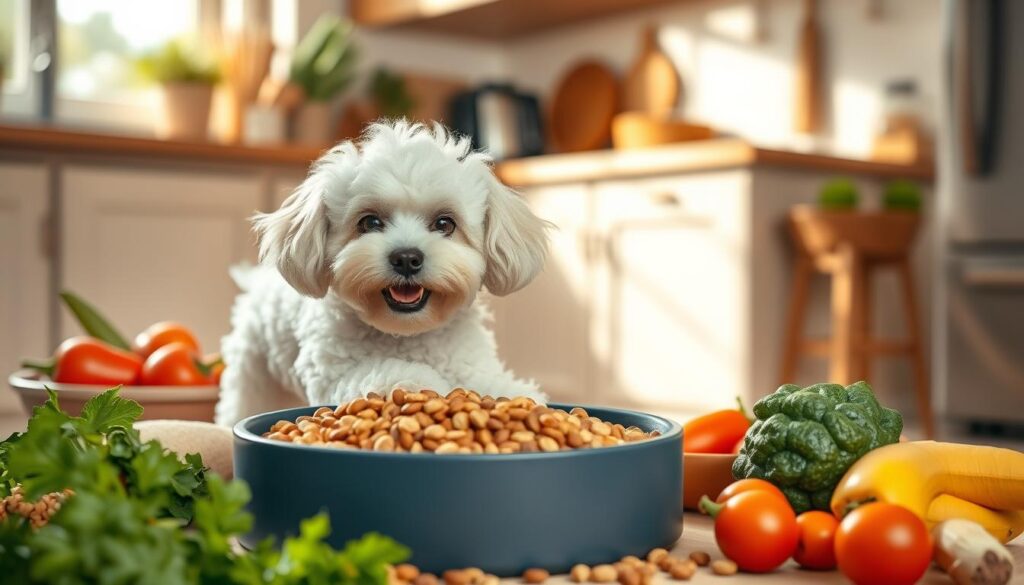
Essential Nutrients for Toy Poodles
Toy poodles need a balanced diet with protein, fat, carbs, vitamins, and minerals. The best dry food should have at least 18% protein. It should also have moderate fat and complex carbs. Vitamins A, B12, and D are key for their health.
Caloric Requirements
The calories toy poodles need depend on their age, size, and how active they are. Adult toy poodles should eat 1/4 to 1/2 cup of food daily, split into two or three meals. Watching their weight is important to avoid obesity and health problems.
Special Dietary Considerations
Toy poodles might have special dietary needs, like food allergies. It’s important to work with a vet to find the right food. This ensures they get the nutrients they need for good health.
Why Toy Poodles Need Specialized Dog Food
Toy poodles have special needs because of their size and energy. They can easily get overweight and have dental problems. So, they need a diet that’s full of nutrients and balanced.
Choosing the right best food for poodles is key. It should have the right mix of protein, fat, and carbs. This helps keep them healthy and happy.
When picking what do poodles eat, look for food that’s made for their nutritional needs. Best puppy food for poodles should have lots of protein for growth. It should also have complex carbs and good fats.
Omega-3 fatty acids, flaxseed, and fatty fish are great for their diet. They provide important nutrients for a balanced diet.
- Dehydrated Limited Ingredient Fish
- Whole Grain Beef Clusters
- Functional Pour Overs: Hip & Joint – Chicken Stew
These foods are packed with nutrients. They can help meet a toy poodle’s nutritional needs. Always consider your pet’s specific needs and talk to a vet to find the best diet.
| Dog Food | Protein Content | Fat Content |
|---|---|---|
| Dehydrated Limited Ingredient Fish | 30% | 20% |
| Whole Grain Beef Clusters | 25% | 15% |
| Functional Pour Overs: Hip & Joint – Chicken Stew | 20% | 10% |
Best Dog Food for Toy Poodles: Top Recommendations
Finding the right dog food for toy poodles is key. They need a diet rich in quality protein, vitamins, and minerals. Poodle puppies also benefit from food high in dietary fiber for their digestive health.
Top brands for toy poodles include Orijen, Acana, and Blue Buffalo. These offer premium dry, wet, and grain-free options. When picking the best food, consider these choices:
Premium Dry Food Options
- Royal Canin – Adult Poodle Breed Specific Dry Dog Food
- Hill’s Science Diet – Adult Chicken & Barley Dry Dog Food
Wet Food Choices
Wet food is great for toy poodles, keeping them hydrated. Look for high-protein, low-filler options.
Grain-Free Alternatives
Grain-free food is good for toy poodles with sensitivities. Choose a well-balanced, nutrient-rich option. Sensitive Kangaroo and Pasture-raised Lamb are popular choices.
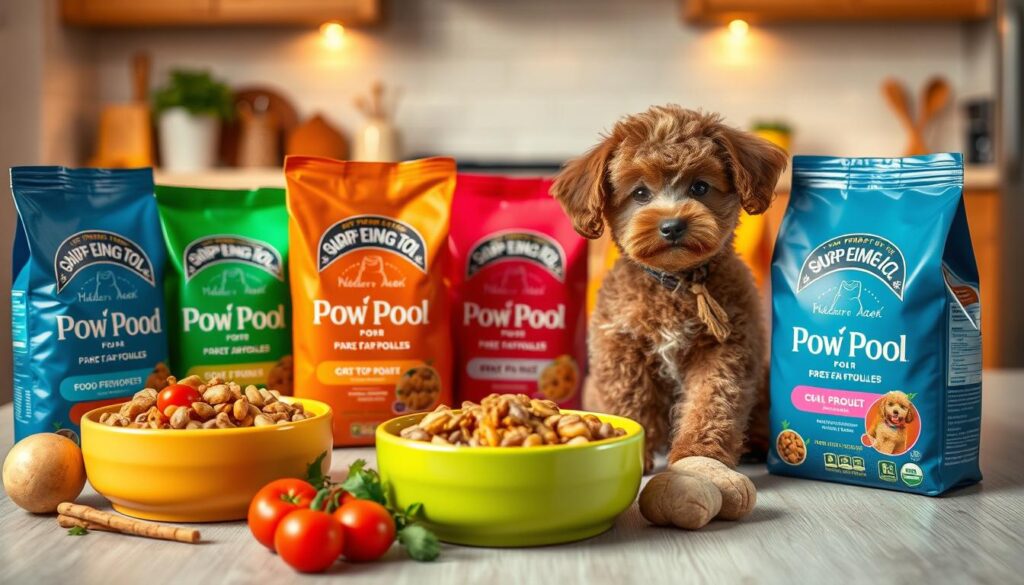
The best dog food for toy poodles varies by individual needs. Consider the options above and talk to your vet to find the perfect food for your pet.
Feeding Your Toy Poodle Puppy
Feeding your toy poodle puppy the right food is key. They need a diet full of protein and calories for growth. Puppy food should have 8.5% of its calories from fat and at least 1% calcium and 0.8% phosphorus, as AAFCO guidelines state.
Look for puppy food with essential fatty acids for brain and eye health. Good choices include Hill’s Science Diet Puppy Healthy Development Small Bites Dry Dog Food and Blue Buffalo Life Protection Formula. Toy poodle puppies need to eat often, three to four times a day, to keep their blood sugar stable.
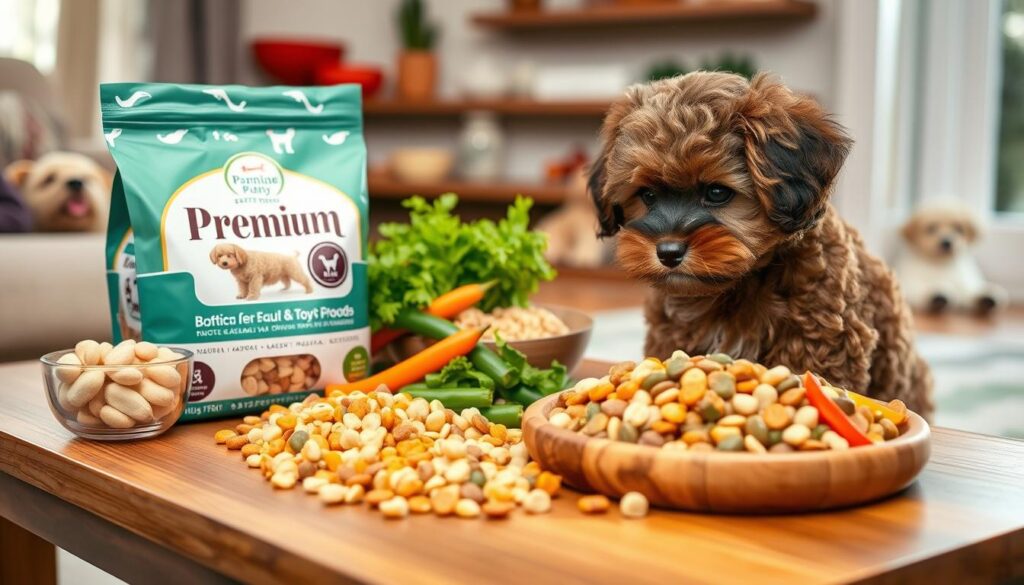
- 22.5% of calories from protein sources
- 8.5% of calories from fat
- 1% calcium
- 0.8% phosphorus
By giving your toy poodle puppy a balanced diet, you support their growth and health. This ensures they thrive.
| Nutrient | Puppy Food Requirement | Adult Food Requirement |
|---|---|---|
| Protein | 22.5% of calories | 18% of calories |
| Fat | 8.5% of calories | 5.5% of calories |
| Calcium | 1% of calories | 0.6% of calories |
| Phosphorus | 0.8% of calories | 0.5% of calories |
Nutrition for Adult Toy Poodles
As toy poodles grow up, their diet needs change. They need a balanced mix of protein, fat, and carbs. Look for dog food that supports their health and happiness. Choose food with high-quality protein like chicken or salmon, and whole grains like brown rice or oats.
It’s important to control how much food they eat. Too much can cause obesity and health problems. Find a dry food that’s rich in nutrients and made for small breeds like toy poodles. Brands like Blue Buffalo or Wellness have good options.
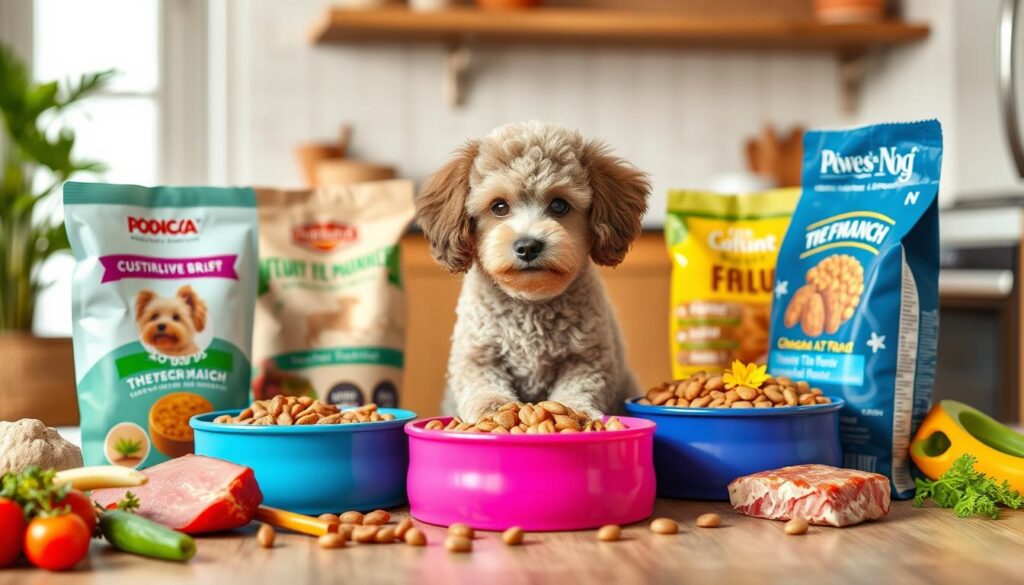
Portion Control Guidelines
To make sure your adult toy poodle eats right, follow these tips:
- Feed 1-2% of your dog’s body weight per day, divided into 2-3 meals
- Monitor your dog’s weight and adjust the feeding schedule as needed
- Choose a high-quality dog food that meets your dog’s nutritional needs
Feeding Schedule
Having a regular feeding time helps your dog’s digestion and prevents eating too much. Feed your adult toy poodle at the same times every day. Adjust the schedule based on your dog’s needs.
Senior Toy Poodle Dietary Requirements
As toy poodles get older, their diet needs change. Senior toy poodles need less protein, fat, and calories. This helps their aging joints and keeps them healthy. The best dog food for senior toy poodle should have the right mix of nutrients, including vitamins and minerals.
Choosing the right food is key. It’s important to pick a high-quality food that fits their needs.
Senior toy poodles have specific needs. Here are some important points to consider:
- Less protein to ease the load on kidneys and liver
- Lower fat to avoid obesity and health problems
- More fiber for better digestion
When looking for the best food for poodles, choose foods made for senior dogs. These foods have less protein and fat. They also have added joint support and antioxidants for better health.
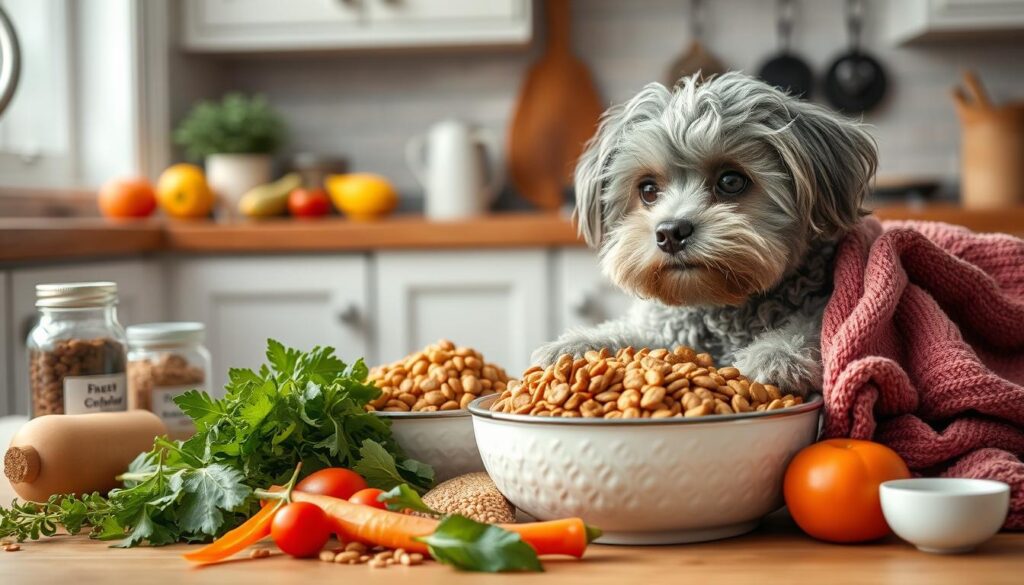
| Nutrient | Recommended Level |
|---|---|
| Crude Protein | 18-22% |
| Crude Fat | 8-15% |
| Crude Fiber | 4.5% (maximum) |
Common Food Allergies in Toy Poodles
Toy poodles can have food allergies. These allergies can lead to skin problems, digestive issues, and other health issues. It’s important to find the right dog food for them, considering their needs and allergies.
Common allergens for dogs include beef, chicken, lamb, and wheat. Soy, eggs, corn, and nuts are also common allergens. If your toy poodle has allergies, look for a dog food with a limited ingredient diet or a novel protein source. For example, a food with salmon and sweet potato might be good for a sensitive stomach.
Here are some tips for managing food allergies in toy poodles:
- Work with your veterinarian to identify possible allergens
- Try an elimination diet to find out what your dog is sensitive to
- Choose a dog food that fits your toy poodle’s needs and avoids common allergens
By picking the right dog food and consulting with your vet, you can help your toy poodle stay healthy and manage allergies. Always talk to your vet before changing your dog’s diet.
| Dog Food | Ingredients | Allergen-Friendly |
|---|---|---|
| Orijen Dog Food | Chicken, fish, eggs | No |
| Blue Buffalo Salmon and Sweet Potato | Salmon, sweet potato, carrots | Yes |
Wet vs. Dry Food for Toy Poodles
Choosing the right food for toy poodles is a big decision. Owners often pick between wet and dry food. Wet food has more moisture and protein, while dry food is easier to store and cheaper.
The best food for a toy poodle depends on what you like and what your dog needs. Some like dry food for its convenience. Others choose wet food for its health benefits. Mixing both can give your dog the best of both worlds.
Here are some benefits of each type:
- Wet food: higher moisture content, more protein, and potentially better digestion
- Dry food: more convenient, cost-effective, and easier to store
Choosing between wet and dry food for toy poodles depends on your situation. By picking the best brand, you can ensure your dog gets a balanced diet.
| Food Type | Benefits | Drawbacks |
|---|---|---|
| Wet Food | Higher moisture content, more protein | More expensive, requires refrigeration |
| Dry Food | More convenient, cost-effective | Lower moisture content, possible digestive issues |
Reading Dog Food Labels
Understanding dog food labels is key to finding the best food for poodles. What do poodles eat, and how can you ensure they’re getting the nutrients they need? The best puppy food for poodles will have a balanced mix of protein, fat, and complex carbohydrates.
The Association of American Feed Control Officials (AAFCO) says commercial dog food must meet certain nutritional standards. The label will show the guaranteed analysis. This includes minimum amounts of protein and fat, and maximum amounts of water and fiber. But, it doesn’t tell you the exact amounts of nutrients.
Here are some key terms to look for on dog food labels:
- Beef: must comprise at least 70% of the total product
- Beef dinner or beef entrée: requires beef to constitute at least 10% of the entire product
- With beef: means beef must be at least 3% of the total product
- Beef flavor: implies there is sufficient beef to flavor the product, which is less than 3%
Consider your poodle’s life stage when choosing food. Puppy formulas or “all life stages” foods are tailored to meet varied nutritional requirements over a dog’s life stages. For example, large breed puppies often require specific formulas to prevent musculoskeletal issues, while senior dogs may need diets that cater to their unique needs.
By understanding what to look for on dog food labels, you can make informed decisions about the best food for your poodle. Always check the ingredient list and look for whole meats, not meat by-products or fillers. With a little practice, you’ll be a pro at reading dog food labels and finding the best food for your furry friend.
| Life Stage | Nutritional Requirements |
|---|---|
| Puppy | High protein, moderate fat, and complex carbohydrates |
| Adult | Balanced mix of protein, fat, and complex carbohydrates |
| Senior | Lower protein, moderate fat, and easy-to-digest carbohydrates |
Homemade Food Options for Toy Poodles
Many owners choose homemade food for their toy poodles. It’s a healthy and affordable way to feed your pet. To make a good diet, pick safe ingredients and follow recipes carefully.
Safe Ingredients
Safe ingredients include chicken, turkey, and fish for protein. Vegetables like peas, green beans, and carrots add fiber. Whole grains like brown rice and oats give energy. Choose ingredients that meet your toy poodle’s nutritional needs.
Recipe Guidelines
Here are some tips for a balanced homemade diet:
- Use a mix of protein sources, like chicken, turkey, and fish
- Add fiber-rich veggies, such as peas, green beans, and carrots
- Include whole grains, like brown rice and oats
- Get advice from a vet or canine nutritionist to make sure it’s right for your toy poodle
By following these tips, you can make a healthy homemade diet for your pet.
Foods to Avoid for Your Toy Poodle
As a responsible pet owner, knowing which foods can harm your toy poodle is key. When looking for the best dog food for toy poodles, steer clear of common allergens and fillers. These can lead to skin issues, digestive problems, and other health issues. Foods like beef, dairy, and soy are often hard to digest and can cause allergic reactions.
Recent studies show over 100,000 pet poisonings happen each year. Foods like grapes and raisins, onions and garlic, and chocolate are toxic to toy poodles. They can cause vomiting, diarrhea, and even kidney failure. Also, avoid best dry food for poodles with fillers like corn and soy. These provide little nutritional value and are hard to digest.
It’s also important to know about other toxic foods for your toy poodle. These include macadamia nuts, avocado pits, fatty foods, and bones. They can cause symptoms like weakness, vomiting, pancreatitis, and digestive blockages. Choosing a best dog food brand for toy poodle that avoids these ingredients helps keep your pet safe and healthy.
Some key foods to avoid include:
- Grapes and raisins
- Onions and garlic
- Chocolate
- Macadamia nuts
- Avocado pits
- Fatty foods
- Bones
By being mindful of these hazards and choosing a high-qualitybest dog food for toy poodles, you can ensure your pet’s long, happy, and healthy life.
Supplements and Additives
When choosing the best dog food for toy poodles, think about supplements and additives. Toy poodles need a balanced diet. Sometimes, their food needs a little extra.
What do poodles eat to stay healthy? They need a diet full of vitamins and nutrients. This keeps them in top shape.
Important vitamins for toy poodles include vitamin D and omega-3 fatty acids. These help their skin, joints, and overall health. But, it’s important to use supplements carefully. Always get advice from a vet to avoid health problems.
- Consult with a veterinarian to identify any nutritional gaps in your toy poodle’s diet.
- Choose supplements made for toy poodles or small breeds.
- Follow the recommended dosage and administration instructions to avoid over-supplementation.
Adding the right supplements and additives to your toy poodle’s diet can be beneficial. Always remember, high-quality dog food should be the main part of their diet. Supplements should just help support their health.
Addressing Special Dietary Needs
Finding the right dog food for toy poodles is key. They need a diet that’s easy on their stomachs and meets their nutritional needs. The best food should be balanced and avoid common allergens.
Good dog food for poodles should have protein, fat, and carbs. Puppies need at least 22% protein, while adults need about 18%. Fat is also important, with puppies needing 15% and adults 5%.
For toy poodles with special needs, consider these points:
- Proper hydration, which is vital for puppies
- Food rich in vitamins and nutrients
- Dry foods that help keep teeth clean
- Wet foods for extra hydration
Choosing the right food is important. Read labels and look for guaranteed analysis. This helps compare different foods. The right food and feeding schedule can keep your toy poodle healthy and happy.
Every dog is unique, and what works for one may not work for another. Always talk to your vet about your dog’s diet. They can help find the best food for your furry friend.
| Dietary Requirement | Puppy | Adult |
|---|---|---|
| Protein | 22% | 18% |
| Fat | 15% | 5% |
| Caloric Intake | 3,820 kcal/kg | 4,075 kcal/kg |
Signs of a Good Diet
A well-balanced diet is key for your toy poodle’s health. When looking for best food for poodles, think about what your pet needs. A good diet shows in healthy skin, shiny coats, and better behavior.
Some signs of a good diet are:
- Healthy digestion and regular bowel movements
- Optimal energy levels and vitality
- Shiny coat and healthy skin
Choosing the right what do poodles eat is vital. For puppies, best puppy food for poodles should have lots of protein and calories. This helps them grow strong.
A balanced diet also keeps your poodle’s digestive system healthy. This reduces the chance of health issues. By picking the right food, your toy poodle can live a happy, healthy life.
| Nutrient | Importance |
|---|---|
| Protein | Essential for growth and development |
| Omega-3 fatty acids | Supports skin and coat health |
| Complex carbohydrates | Provides energy and fiber |
Transitioning to New Food
When introducing your toy poodle to new food, do it slowly. This gradual change, lasting 7-10 days, helps avoid digestive issues and health problems. Begin by mixing 25% new food with 75% old food for the first two days.
Next, increase the new food to 50% on days 3-4. Then, to 75% on days 5-6. By day 7, switch to 100% new food. This slow introduction lets your dog’s stomach get used to the new food. Keep an eye on your dog’s health and behavior, looking for signs of upset like vomiting or diarrhea.
Choosing the right dog food is key. Opt for a nutrient-rich food that supports a healthy coat and immune system. Always talk to your vet to find the best diet for your toy poodle, considering any health issues or dietary needs.
Some important things to remember during the transition include:
- Keep an eye on your dog’s stool quality and adjust the transition as needed.
- Watch for signs of digestive upset, such as vomiting or diarrhea.
- Make sure your toy poodle gets all the nutrients they need for good health.
By following these tips and picking the right food, you can make the transition smooth for your toy poodle.
Conclusion: Ensuring Your Toy Poodle’s Nutritional Success
Choosing the right dog food for toy poodles is key for their health. A balanced diet with quality proteins, fats, and carbs is vital. This ensures your Toy Poodle gets the best nutrition for their health and happiness.
It’s important to focus on protein and fats for muscle and brain health. Also, watch portion sizes and introduce new foods slowly. A careful diet plan, with your vet’s help, will keep your Toy Poodle happy and healthy.
FAQ
What are the essential nutrients for toy poodles?
Toy poodles need a diet rich in protein, fat, carbs, vitamins, and minerals. They should get at least 18% protein. They also need moderate fat and complex carbs.
What are the caloric requirements for toy poodles?
Toy poodles need specific calories based on their age, size, and activity level. This is important when picking dog food.
What special dietary considerations should be made for toy poodles?
Toy poodles might have food allergies or sensitivities. These need to be considered when choosing dog food. It’s important for their health and well-being.
What are the top recommendations for premium dry food, wet food, and grain-free options for toy poodles?
There are great dog food options for toy poodles. These include premium dry food, wet food, and grain-free choices. They meet their unique nutritional needs.
What should be considered when feeding a toy poodle puppy?
Feeding a toy poodle puppy is important. They need a diet rich in protein, fat, and carbs. This supports their growth and development.
How do the nutritional needs of adult toy poodles differ from puppies?
Adult toy poodles have different nutritional needs. They need a balanced diet with moderate protein, fat, and carbs. Proper portion control is also key to prevent obesity and health issues.
What dietary requirements should be considered for senior toy poodles?
Senior toy poodles need a diet that supports their aging joints and health. They require less protein, fat, and calories. Yet, they must get essential nutrients.
What are common food allergies in toy poodles, and how can they be managed?
Toy poodles can have food allergies. These can cause skin issues and digestive problems. Identifying and managing these allergies is important. Hypoallergenic options can help.
What are the benefits and considerations of wet vs. dry food for toy poodles?
Wet and dry food both have benefits for toy poodles. They offer convenience, nutritional value, and taste. Mixing them can provide a balanced diet with essential nutrients.
What should I look for when reading dog food labels for my toy poodle?
Reading dog food labels is key. Look for protein, fat, and complex carbs. Be aware of allergens and fillers.
What are the considerations for homemade dog food for toy poodles?
Homemade dog food can be healthy and cost-effective. It requires careful planning. Choose safe ingredients like protein sources, veggies, and whole grains.
What foods should be avoided for toy poodles?
Avoid foods with common allergens like beef, dairy, and soy. Also, steer clear of fillers like corn and soy. They offer little nutrition and can be hard to digest.
What supplements and additives can be beneficial for toy poodles?
Supplements like vitamins and omega-3 fatty acids can be beneficial. They support skin and joint health. Use them wisely and with vet guidance.
How can I address special dietary needs for my toy poodle?
Toy poodles with special needs require careful management. A balanced diet and addressing health concerns are key. This supports their overall health.
What are the signs of a good diet for my toy poodle?
A good diet shows in your toy poodle’s health. Look for a shiny coat and healthy skin. A good diet also improves energy and reduces anxiety. It supports digestive health and reduces health risks.
How do I transition my toy poodle to a new dog food?
Transitioning to new food can be tough. Do it gradually over 7-10 days. Watch for signs of upset stomach or other issues to ensure a smooth change.
Also Read:
- Best Dog Food Toppers to Enhance Meals: Complete Guide for Pet Parents
- The Best Dog Food for King Charles Cavaliers: Complete Nutrition Guide
- Best Dog Food for Malamutes: Nourish Your Alaskan Companion


